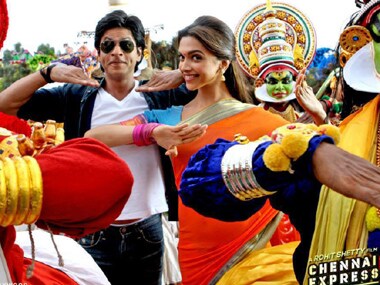As a sociological glue Bombay films have been magnificent. They created and sustained a myth of India, holding Hindu and Muslim, rural and urban, resident and diaspora, young and old together. However the myth has failed at one level. The one dualism Bollywood has been inept at bridging is the divide of North and South. This dualism has often been seen as a division of labour with North (more Aryan) providing the heroes and the South, the heroines. The long retinue from Vyjayanthimala to Sridevi testifies to this. Southern heroes have never been able to capture the north. The efforts of Rajnikant, Chiranjeevi and Kamal Hasan were episodic. The latter’s Ek Duje ke Liye was a flash in the pan. About the only recent exception one can think of is Raanjhanaa where Dhanush , Rajnikanth’s son-in-law, pulled off a brilliant role as a nukkad genius. This was particularly significant as our Kolaveri hero did not know Hindi. Otherwise attempts to create North/ South unity or reciprocity have been futile and Bollywood was happy with stereotypes. The South has been content to remain Southern and even Mani Ratnam’s Roja and Bombay were glorious exceptions which enforced the rule. Otherwise Bollywood remained content with stereotypes, where an asinine joke repeated often enough served as a substitute for dialogue and representation. Rohit Shetty’s Chennai Express merely reinforces this conventional world, where everyone South of the Deccan is “ Madrasi” and sports a cringeworthy accent. Chennai Express is a trial to fans in two ways. Shah Rukh Khan is miserable and juvenile and his performance despite the Rohit Shetty Midas touch must have been a severe loyalty test. More acutely it was a test of Bollywood’s sensibilities about the South. At a time when the politics of identity and representation are critical, Chennai Express is a sociological conundrum. [caption id=“attachment_1026069” align=“alignright” width=“380”]  Rohit Shetty’s Chennai Express merely reinforces the conventional world, where everyone South of the Deccan is “ Madrasi”. Image: From Facebook[/caption] As this is not a review, I will stick to the rudiments of the story. The hero plans a holiday in Goa carrying the ashes of his grandfather, content to believe the ashes could be immersed in Goa, in the belief that it would eventually reach Rameswaram. Shah Rukh and his two side-kicks (who disappear after first twenty minutes) look at the map like illiterate tourists convinced of their discovery. Shah Rukh steps on the wrong train that takes him to Chennai. The plot then unfolds into disarray revealing all the disgusting stereotypes that North holds about the South. Let me list them out. The first is the colour. There is a divide across colour except for the heroine. Then there is language. More than language, the emphasis is on accent. No one talks about a proper English in the global age, yet Hindi is still custodial about its language. The Tamil use of Hindi is satirized and mimicked as if things have not changed since the DMK days. Third, as a migrant seeking employment and community, the Tamilian is presented as part of a criminal community, the Godfather network popularized by the legend of Vardarajan Mudaliar and the film Dayavan. Language as accent and the cliché of the Tamil criminal create all the reasons for comedy as spoof, slapstick and stereotype. The final effect is so irritating that neither the beauty of the landscape nor occasional flashes of the old Deepika Padukone make for adequate remedies. The sheer illiteracy and inanity of stereotype is overwhelming. Stereotypes can be humane, comfortable even if hypocritical. The symbolic unity of India is often created through stereotypes of people celebrating each other’s festivals. In many of these forays, stereotypes allowed space for exception and in fact the plot developed in many films by massaging and playing stereotypes. The idea is that North and South is a subconscious unity bridged by the sacred complex of India, its rivers, its pilgrimage sites, its networks of temples. Shah Rukh himself takes recourse to it. During an interrogation he spoofs his own answers by invoking his famous dialogue “My name is Khan (Rahul) and I am not a terrorist”. Here the same poignant words become inane. In one, he challenges dominant stereotype, in the second he succumbs inanely to stereotype. Comedy when it reinforces stereotype can be both clumsy and inane. In desperation, throughout the film, Shah Rukh invokes his own dialogue from earlier hits. This is narcissistic and for his fans, it might be fun. But the very narcissism of the star reinforces the play of stereotype. One cannot find one redeeming moment in the film. In fact even the final reconciliation between hero and his adversaries is a physical almost primordial one. The other suitor, a giant of a man, stops the fight, admitting Shah Rukh’s courage. The unity is primordially male. There is no cultural confluence, North and South agree to a temporary truce and the audience is relieved to go home. My quarrel is with Shah Rukh. How can a versatile actor who acted in Baazigar, Veer Zaara, DDLJ, My Name is Khan to name a few, play such low comedy? In fact it is low life comedy and it raises serious issues about representation. Representation has its own grammar of fairness. Here in sticking to stereotypes and creating an obsession with himself Shah Rukh loses a great opportunity. Stereotypes block awareness of the other, and other alternatives and become undemocratic. North and South, despite the loyalty of fans, get divided further by Chennai Express. Shiv Visvanathan is a social science nomad.
North is north and south is south and never the twain shall meet. Shah Rukh Khan misses a golden opportunity to bridge the north-south divide in Chennai Express.
Advertisement
End of Article
Written by Shiv Visvanathan
Shiv Visvanathan is a social science nomad. see more


)
)
)
)
)
)
)
)
)



